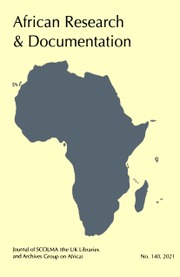No CrossRef data available.
Article contents
The Particular and the Work of Retrospection in Isaac Fadoyebo's ‘A Stroke of Unbelievable Luck’
Published online by Cambridge University Press: 25 April 2022
Extract
Isaac Fadoyebo's Second World War memoir A Stroke of Unbelievable Luck is an unusual and compelling memoir of a West African soldier's Second World War service. Although much of Fadoyebo's narrative centres on the Second World War, the memoir as a whole has much more to offer. Fadoyebo uses his military service to structure a narrative that covers much of his life until the 1980s. Although this coverage is not systematic, it leaves the reader with a vivid impression of Fadoyebo's upbringing, education, post-war career, and his positioning of the past from the vantage point of old-age. This article will focus on the role of travel, showing how the constraints of military service and wartime shaped a distinct descriptive language. It will argue that this language is characterised by attention to the particular. More specifically, it will show how the particular becomes especially important when the ‘bigger picture’ of movements, motivations and landscapes remains unknown to the soldiers.
- Type
- Articles
- Information
- Copyright
- Copyright © International African Institute 2014


